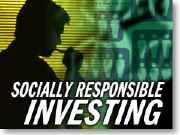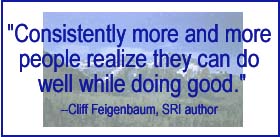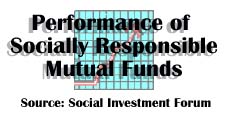|
Investing with a conscience
|
 |
March 26, 1999: 5:35 p.m. ET
Socially responsible investing is one of the fastest growing trends in the market
|
NEW YORK (CNNfn) - You support the local homeless shelter. You take recycling labels seriously. And you vote for politicians who share your social and environmental goals.
But when it comes to making investment decisions, you may be missing out on an opportunity to make a statement - not to mention some cold hard cash.
"People sometimes haven't had that Ah-Ha! moment where they realize they can still have all of their savings, their pension money, and their consumer dollars, but it can be channeled to build a better world," said Elizabeth Elliot McGeveran, spokeswoman for the Social Investment Forum. "They may be doing all these wonderful things in their day-to-day life and just haven't made the connection yet."
The ABCs of SRI
Socially responsible investing (or SRI) is one of the fastest growing trends in the financial markets.

The Forum's most recent survey on the industry shows that assets in socially screened mutual fund portfolios surged 227 percent from 1995 to 1997 (from $162 billion to $529 billion), sparked largely by anti-tobacco sentiments.
For the first time ever, the dollar value of assets under management in these portfolios topped $1 trillion in the United States, growing from $639 billion in 1995 to $1.185 trillion in 1997 -- an increase of 85 percent.
And the number of socially responsible mutual funds tripled to 144 in 1997, from 55 in 1995. Today, that number has climbed even higher.
"These funds are growing much faster than the mutual fund marketplace is growing overall," McGeveran said.
"It used to be you'd go to work, invest your money and it didn't matter if it hurt people or the environment," she said. "People aren't taking that anymore. That extreme disconnect between your home life and your financial life is no longer accepted in American culture."
The screening process
Socially responsible mutual funds screen companies carefully before including them into their portfolio. Ten or fifteen years ago, most would exclude businesses involved in the tobacco, alcohol and gaming industries.
Today, they've got higher standards still. SRI funds use a variety of criteria, but most zero in on one or more of the following: environmental policies, community impact, product safety, diversity in the workforce, women in upper management positions, family friendly benefits, and human rights policies.
Companies involved in the nuclear power business, the weapons industry and those with a tarnished track record abroad also frequently get blacklisted by these funds.
"The history of this industry grew out of the old fashioned approach to morality," said Amy Domini, president of the Domini Social Equity Fund "One hundred years ago the Methodists thought it was a sin to make money off of tobacco or alcohol and what came out of that was positive social change."
McGeveran noted that social screens do not mean these funds disregard the bottom line.
On the contrary, she said, socially responsible funds use the same financial screening methods that all mutual funds use, she said. They look at the corporate fundamentals, the strength of the management team, products sold and profit potential.
"The whole philosophy is that you do all same financial screens and analysis, but you add this extra layer of screening," McGeveran said.
Taking on the S&P
The Forum reports that ten of the 14 screened mutual funds it tracks with assets of $100 million or more last year earned top marks for performance from either Lipper or Morningstar, or both.
Of the 41 retail funds, that are at least three years old, 21 earned "A" or "B" rankings from Lipper for one- and/or three-year total returns.
Thirteen screened funds carried four- or five-stars from Morningstar for three-year risk-adjusted performance at the end of 1998. And all together, more than half earned spots in the top two performance tiers by Lipper or Morningstar, or both.
One of the oldest and most popular SRI funds is the Domini Social Equity Fund, which has outperformed the benchmark S&P index consistently. In 1998, the fund earned 32.99 percent. It earned 24.31 percent in the last five years.
By comparison, the broader S&P 500 index returned 28.58 percent for the latest year and 24.04 percent for the same five year period.
The fund's assets also grew more than 150 percent to $715 million last year, following a 148 percent jump in 1997. Its holdings include stock in Microsoft Corp. (MSFT), Intel Corp. (INTC), Wal-Mart Stores Inc. (WMT), Merck & Co. (MRK) and Coca Cola Co. (KO).
"We believe that the Fund's strong investment performance and growth in assets clearly indicate that the era of socially responsible investing is beginning to dawn," Domini said.
(Click on the graphic below for a breakdown of the equity funds tracked by the Social Investment Forum.)

Not all SRI funds, however, share Domini's track record.
Data from the Social Investment Forum reveals that in the last year, just 14 of the 45 socially responsible equity funds it tracks outperformed the S&P 500. Only five outperformed the S&P in the last three years.
The worst performing social equity funds, according to the Forum, are Bridgeway Ultra Small Company, Calvert New Vision Small Cap A, Calvert New Vision Small Cap C, and the New Alternatives Fund - each of which lost more than 20 percent in the last year
Going the distance
It's not all about pre-picked mutual funds though.
Individual investors can just as easily create their own screens and do some social investing of their own, said Cliff Feigenbaum, co-author of "Investing with Your Values: Making Money and Making a Difference," due out in May.
For starters, he said, you should make up a list that includes industries from which you do not wish to profit. You probably wouldn't want to buy stock in Philip Morris (MO), for example, if you've got a "no tobacco products" screen, he said.
You should also begin researching investments that support your social goals. That may include a cleaner environment or greater workplace diversity. Feigenbaum said you might want to look to companies in the emerging fields of alternative energy or natural foods. You could also invest in some government agencies that address your concerns.
Another way to make a difference, is by focusing on community based investing, a new but rapidly growing form of "Natural Investing" that puts your money into the hands of grass-roots programs and economically disadvantaged communities - either at home or abroad.
Feigenbaum said community investing initiatives include affordable housing, small business lending, targeted investments in urban and rural parts of the country and microenterprise development throughout the world.
Lastly, he said, you can work from within. Buy up stocks in companies that you believe could use some guidance. Then become an activist, calling attention to important ethical, social or environmental issues at shareholder meetings.
"This is a growing area," Feigenbaum said. "Consistently, more and more people realize they can do well (financially) while doing good."
He added he expects to see the percentage of overall equity investments targeted to socially responsible companies double in the next five years.
Demographics
Industry insiders say women, and those who live on the more liberal-minded West Coast, make up the largest component of socially responsible investors.
"Women seem to get it, which is nice, because they haven't always been trained to think only of profit," Feigenbaum said.
The age brackets of these investors generally range from 24 to 49, but Domini said that varies widely - as do their agendas.
"I think that a lot of the older generation (involved in SRI) comes out of the peace and justice orientation that grew out of the Vietnam war protests and early civil rights movements," she said. "The newer orientation is growing out of the right-living concepts. So even though I come out of the peace and justice movement, and the 20-year-old is focused on organic lifestyles and right-living, they are still going after political issues that they share with me."
Advocates for SRI say they've made great strides towards dispelling the myth that ethics and financial prosperity are mutually exclusive goals.
And, they say, the potential for individual investors to promote social change through corporate screening will only grow stronger in the 21st Century. 
--by staff writer Shelly K. Schwartz
(Part two of this series will appear on CNNfn.com on April 2)
|
|
|
|
|
 |

|

